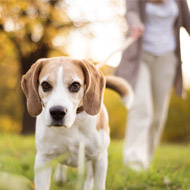Vets warned of monensin toxicity in dogs

So far, almost all reports involve farm dogs but due to the bolus regurgitation process, dogs walked on farmland are also at risk.
Veterinary surgeons are being warned of the risks of monensin exposure to non-target species.
In 2015, the Veterinary Medicines Directorate (VMD) saw an increase in reports of accidental canine exposure to Kexxtone 32.4g (monensin), the drug used in cattle feed to control ketosis.
Reported symptoms included neurological issues, such as seizures, lethargy, muscular problems, locked jaws, problems with balance, confusion, vomiting and death.
So far, almost all reports involve farm dogs but due to the bolus regurgitation process, dogs walked on farmland are also at risk.
As a result, the VMD requested that the following warning be added to the Summary of Product Characteristics (SPC):
'Do not allow dogs, horses, other equines or guinea fowl access to formulations containing monensin. Due to the risk of bolus regurgitation, do not allow these species access to areas where treated cattle have been kept. Ingestion or oral exposure to monensin can be fatal in these species.'
Writing in Veterinary Record letters, the VMD suggested that when prescribing Kexxtone, vets should advise clients of the dangers to non-target species, whilst also remaining aware of the effects of monensin when dealing with cases that present neurological or myopathic problems.
Vets are encouraged to report all adverse reactions to the applicable marketing authorisation holder, or to the VMD via: www.gov.uk/report-veterinary-medicine-problem



 The Veterinary Medicines Directorate (VMD) is inviting applications from veterinary students to attend a one-week extramural studies (EMS) placement in July 2026.
The Veterinary Medicines Directorate (VMD) is inviting applications from veterinary students to attend a one-week extramural studies (EMS) placement in July 2026.